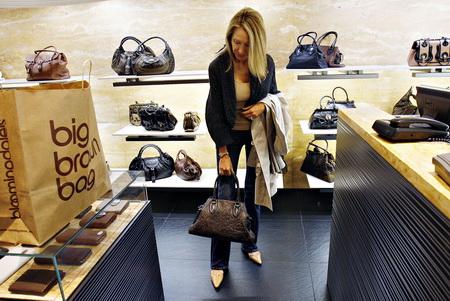
Jane Sieberts, visiting from Los Angeles on business, examines a Fendi handbag at Bloomingdale's in New York. The luxury Italian fashion house wants to turn all 15 stores in China into upscale versions of its high-end flagship in Shanghai's Henglong Square. [Agencies]
Luxury Italian fashion house Fendi recently opened a newly refurbished flagship store in Shanghai rendered in black and honey travertine marble juxtaposed with hand-carved fiberglass panels in white.
Now the fashion house wants to turn all 15 of its stores in China into luxurious copies of its flagship store.
LVMH purchased Fendi in 2001 and, after a few rough years, the Roman fashion house has a new design concept and a renewed contract for head designer Karl Lagerfeld.
Since taking the top job at Fendi in 2003, CEO Michael Burke has brought clarity and confidence to the formerly family-run business.
Designer Karl Lagerfeld, who had threatened to leave the house when his contract expired, said that Burke "got ready in six months what the others couldn't do in four years".
Burke said he wants to transform Fendi's 15 stores in China into bigger ones versus the idea of opening more stores.
"We will invest more in turning old stores into flagship-style stores in the next five years rather than opening up new stores, because you need to keep Fendi really in the high end. The Fendi model will be more luxurious, limited and exclusive," he said.
"China is extremely complicated, but everything is possible," Burke said.
Burke said he is proud that Fendi was the first internationally known luxury house to stage a fashion show on the Great Wall in the autumn of 2007.
"You didn't know how difficult it would be, and if you had known how difficult it was, you would never have done that," he said.
"Karl said we wouldn't be able to do it, but we made it. China is a place where you can dream," he said.
10 percent growth in China
Although Fendi suffered a slump in sales in the third quarter on a global scale due to the financial crisis, Fendi continues to enjoy growth exceeding 10 percent in China.
"There was never a crisis in China," Burke said. "And by the end of 2011, there will be another large store in Hubei province.
He also said Fendi will have new garments for men and a new line of watches to introduce in China next year.
"China is the only market in the world where the men's business is larger than the women's. By June next year, you will see a series of men's collections," he said.
Burke, who was born in France, has been in the luxury business for more than 20 years after first working in the real estate field.
When the businessman entered the luxury goods business, he was drafted in to head Christian Dior's US operation, and later headed the Louis Vuitton brand's American operations before his appointment to Fendi in 2003.
In 2001, LVMH bought out joint-venture partner Prada, bringing LVMH's total cost of acquiring Fendi to $1.1 billion.
Founded in Rome in 1925 by Edoardo and Adele Fendi, the luxury Italian fashion house began as a handbag and fur shop. Within five years, as the fur line expanded, the brand began to establish its name outside the Italian capital.
The founders' daughters soon joined the company, bringing their own designs to the brand.
But it was in 1965, after Fendi's partnership with eccentric designer Karl Lagerfeld, which the brand truly took off internationally.
Lagerfeld, also the creative director for French fashion house Chanel and head of his own label, has been credited with changing the way the house used fur, ensuring its place in high fashion.
Fendi today operates more than 160 boutiques in 25 countries.





